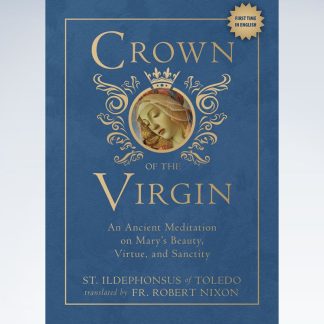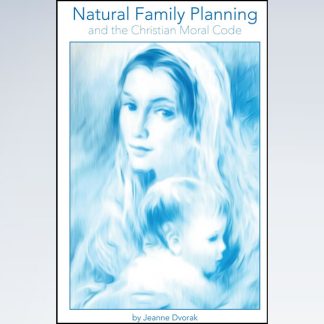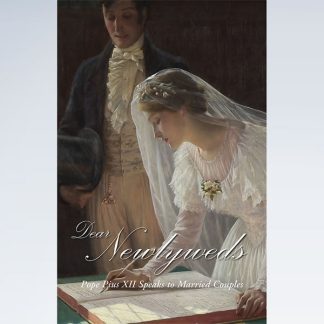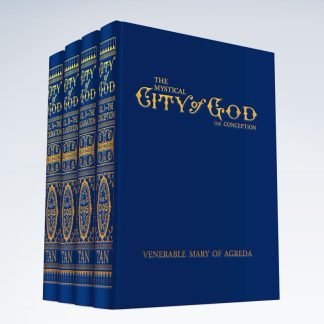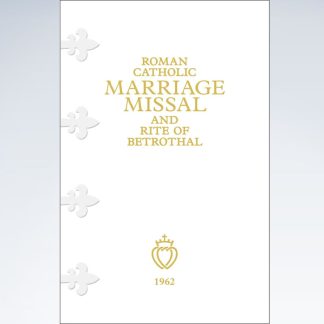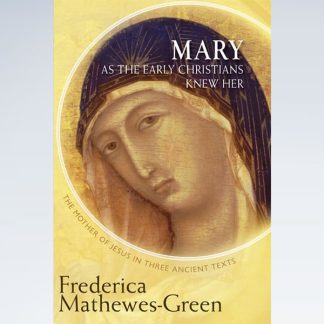

The object of this feast is to commemorate the dignity of the Mary as Mother of God. According to Traditional Roman Rite, this feast is observed on October 11th.
THE MATERNITY OF THE BLESSED VIRGIN CONSIDERED AS A MATERIAL FACT
The maternity of the Blessed Virgin may be considered either as a material , or as a moral fact. The former is the lowest view to take of it, and yet even in this light the dignity is so sublime and immense, that no human thought can reach high enough to comprehend it.
For it is a fact too certain to be disputed, that some part of the virginal body of Mary was hypostatically united to the Divine Person, both in the original formation of Christ’s body by the Divine Power, and in the first augmentation of it, by the nourishment it received from the Blessed Virgin. This being so, it is highly probable, for several reasons, that that first substance which Jesus borrowed from His most pure Mother is still remaining in His now glorious Body, increased indeed but not changed.
The flesh of Christ, says St. Augustine, is the flesh of Mary, and although it was raised to great glory in His Resurrection, yet it still remained the same that was taken from Mary. And after him St. Peter Damian, diving still deeper into this mystery, and rapt in an ecstasy of admiration, does not hesitate to affirm that God was in Mary by identity. Whereas, says this Saint, God is in other things in three different ways , by His essence, by His power, and by His presence. He was in the Blessed Virgin in a fourth special manner, namely by identity, as being one and the same thing with her. At this let all creation be silent and tremble ; for who can venture to gaze upon the immensity of such a dignity.
It is the opinion of some, that the heart of the child in the mother’s womb has properly no motion of its own, but is moved only by the motion of the mother’s heart. Though I do not look upon this to be true, it is certain that the child in the womb has no respiration, and therefore it may be truly said to live by the mother’s breath.
Consequently, as long as the Blessed Virgin bore the Incarnate Word within her womb, she was in some manner His life, because she gave Him breath; and for the same reason the Word Incarnate, during the time that He remained thus confined within her, might acknowledge her to be His life and His breath, and thus He was idem cum ipsa, one and the same thing with her, one life and one breath.
This is also the opinion of St. Thomas, who looks upon the child in the womb and its mother as but one thing, in the same manner that the tree and the fruit upon it are one. And for this reason he dates the commission of our Guardian Angels, to guard and defend us, not from the time of our conception, but from our birth, when the fruit, now thoroughly ripe, drops from the tree. According to. this doctrine it might he truly said, that this ever-blessed Fruit of this incomparable Mother was one and the same thing with her, since He was truly Fructus ventris, the Fruit of her womb.
THE MATERNITY OF THE BLESSED VIRGIN CONSIDERED AS A MORAL FACT
He can have no soul, who does hot feel himself wholly lost in admiration at such wonders; and yet, as I said before, the maternity of the Blessed Virgin, considered as a material fact, is the least wonderful part of the subject. What will it he then, if we consider it as a moral fact, that is, as involving all those prerogatives that naturally belong to it? I confess that the very thought of these prerogatives astonishes me, and that I am bewildered in contemplating them. For the dignity of Mother of God, in this moral point of view, is absolutely the highest rank to which a pure creature can be raised, without exceeding its own proper limits.
It is the very closest possible union of a creature with the Supreme Uncreated Good. It is so near an approach to Deity, notwithstanding the infinite distance between God and any created thing, that St. Thomas could not find more appropriate terms in which to express it than by saying, that in its operation it comes closer than any thing else to the limits of the Divinity .
And in this sense he styles our Blessed Lady, Affinem Deo, that is, according to Cajetan, bordering upon God; though no doubt she might also as properly be said, in the ordinary sense of the word affinis , to be a kinswoman of God, since she truly is, and ought to be called, His Mother. For this reason likewise, there is a peculiar species of worship due to her, which belongs to her alone, and is superior to all that may be granted to any other Saint.
For her dignity as Mother of God is of a rank far superior to that of all other Saints or Angels, and belongs in some manner to the dignity of the hypostatical union, on account of its necessary connection with it. Hence the Blessed Virgin, as I have already observed, forms a choir by herself in the Kingdom of Glory, and is exalted to a greater elevation above the other choirs in the empyreal, than the empyreal itself, though made to be the court and palace of God, is raised above the lower heavens, which were only designed for the use and benefit of men.
O that I could express to thy honour, great Mother of God, the sentiments which l have conceived of thee in my heart! But alas! I fear that my words will fall far short of what my thoughts Suggest. Perhaps however the following illustration may, in some measure, help me to make myself understood. We all pay, with good reason, great honour to the renowned mother of the Machabees, for having given the world seven such brave and heroic champions, who despised the barbarous cruelty of Antiochus, and even defied that fierce and haughty tyrant.
Suppose then, that this mother had given the world, not only that small yet generous band of martyrs, but also that legion, who were crucified for the sake of Christ on the famous Mount Ararat, where, sprinkling with their blood those otherwise barren mountains of Armenia, they clothed them with nobler palms, the tokens of their victories, than Palestine could ever boast. How great an increase of honour would not this have brought to her!
Again, if she had been the mother, not only of that legion of ten thousand glorious martyrs, but of that vast host of full eleven millions, whom Genebrard computes to have suffered in the Church from its beginning down to his own days, what should we say then?
But once more, if to all those millions of martyrs we were to add for greater numbers still of confessors, anchorets, prelates, preachers, doctors and virgins, who have no less adorned the peaceful ages of the Church by their learned writings and virtuous actions, than the martyrs have immortalized the days of persecution by their glorious combats, sufferings and blood; and if we supposed that this heroine had been the mother of them all, would not such a mother well deserve that the Holy Ghost Himself should take up the pen, with much more reason than He did for that happy woman, who was mother only of the Machabees, and should, for an ever-lasting monument of her glory, write this high commendation to all future ages, that the mother was to be admired above measure, and worthy to be remembered by all good men?
And yet, even though we Supposed her to be the mother of all the Blessed in Heaven, and, were it possible, of all the Angelic Hierarchies also, still what would such a mother as this be, in comparison with the Mother of God? She would not be worthy of being called even her handmaid. Judge then how great is that honour which must be due to Mary.
Perhaps, however, you will say that this maternity is a high-sounding title, it is true, but still only a title, an empty name, and nothing more. Far otherwise. The maternity of the Blessed Virgin, so far from being an empty name, is rather like the shady groves of Libanus, where charming beauty and rich abundance loaded the branches of the verdant trees.
The dignity of being Mother of God was not to the Blessed Virgin a dignity barren of fruit, but one that yielded her an ever ripening harvest; for it has conferred on her a dominion of highest excellence, not only over all the infinite treasures of her Divine Son, but even over His very person itself, so that she could command Him with the frill authority of a mother. Josue, the first commander of his age under the great God of armies, fearing lest the approaching darkness of night should rescue from his sword those enemies already so discomfited that not even flight could have saved them, with a confidence more than of man, commanded the sun to stand still, as though ambitious to detain him, his witness shall I say, or his companion in victory. The sun, to the astonishment of all nature, which, till then, had never seen so signal a departure from her established laws, immediately stood still in the height of his career: The sun stood still in the midst of heaven, and hasted not to go down the space of one day.
O how much greater a miracle was to be seen within the walls of Mary’s poor house in Nazareth, not for the space of one day only, but for full thirty years together! Here might be seen a glorious Sun now standing still, now in motion, obedient to the voice and command of a tender maiden, the Lord obeying the voice of man. But there was this difference, that when God obeyed Josue, it was only because it was His own will and pleasure to do so ; whereas He obeyed Mary because He was subject to her, and had made it His duty to obey her.
There are, as divines commonly observe, five kinds of service which all children are under the obligation of rendering to their parents, love, respect, assistance, gratitude, and obedience. Some are of opinion that Christ our Lord, on account of His sovereign dominion over all creatures, and consequently over His Mother also, was exempt from this last duty or obligation of obedience. But I know that there are others who hold the contrary. And the reason they allege is, that Christ as man was subject to all the laws and obligations of nature, and that consequently He must also have been subject to this of obedience and submission to parents; especially since this is a law of nature, on the one hand exceedingly commendable and pious, and on the other, in no way derogatory to the supreme dignity of Christ our Lord.
For, as Aristotle observes , the dominion of parents does not deprive their children of the smallest part of that liberty of inheritance, which gives them a right to the lordships, titles, and estates, to which they are born, nor does it make them less noble or dignified. And therefore Christ might very well be subject to the maternal power of the Blessed Virgin, and still retain His sovereign power; the more so seeing that, though born a king, He had not yet assumed the sceptre of universal sway which belonged to Him. But though we allowed that the Divinity of Christ had, if we may use the expression, emancipated Him from the maternal rule of Mary, it would, notwithstanding, be sufficient for the honour of the Blessed Virgin that He did obey her, without being bound, as if really subject to her. For He obeyed her, not once only, nor under one circumstance, but upon every occasion, as living really in subjection.
Therefore St. Bonaventure, taking those words of the Gospel: And was subject to them , does not hesitate to say, that Mary had God for her subject. And this in so strict a sense, that we may boldly lay down this great truth, to the glory of the Blessed Virgin, that so greatly exalted was her dignity, that she would have been superior even to her Son, and superior in the fullest meaning of the word, had it not been that her Son was God. But in the meantime, dear reader, what emotions do you feel in your heart at the recital of such glorious things of this beautiful City of God? If you cherish the very smallest spark of devotion towards her, you cannot hear of such wonders, without its spreading more and more within you, until, like the hidden fires of a volcano, it breaks forth into flames of the most ardent love. And yet I have not said all.
Source: “The devout client of Mary instructed in the motives and means of serving her well” by Paolo Segneri, 1624-1694.
“But in a more special manner it is fitting that those mothers of this our age, who being weary, whether of offspring or of the marriage bond, have the office they have undertaken degraded and neglected, may look up to Mary and meditate intently on her who has raised this grave duty of motherhood to such high nobility. For in this way there is hope that they may be led, by the help of grace of the heavenly Queen, to feel shame for the dishonour done to the great sacrament of matrimony, and may happily be stirred up to follow after the wondrous praise of her virtues, by every effort in their power.” — Encyclical of Pope Pius XI “Lux Veritatis” on The Council of Ephesus and the Divine Maternity of the Blessed Virgin Mary.

-
Crown of the Virgin: An Ancient Meditation on Mary’s Beauty, Virtue, and SanctityUS$ 27.00
-
Natural Family Planning and the Christian Moral CodeUS$ 14.00
-
Dear Newlyweds. Pope Pius XII Speaks to Young CouplesUS$ 20.00
-
The Mystical City of God (Set of 4 Books)US$ 162.00
-
Roman Catholic Marriage Missal and Rite of BetrothalUS$ 9.00
-
Mary As the Early Christians Knew HerUS$ 22.00
VIRGÓ SACRÁTA is a Christian mission-driven online resource and shop inspired from the beauty of Catholic faith, tradition, and arts. Our mission is to “Restore All Things to Christ!”, in continuing the legacy of Pope St. Pius X under the patronage of the Blessed Virgin Mary. “Who is she that cometh forth as the morning rising, fair as the moon, bright as the sun, terrible as an army set in battle array?” O Mary, conceived without sin, pray for us who have recourse to Thee.

